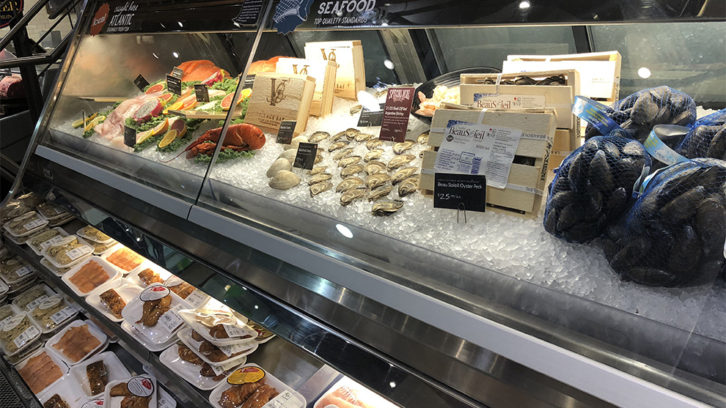How the coronavirus outbreak is affecting Nova Scotia businesses — in both bad and good ways
From plummeting seafood prices to growing demand for online ESL classes, coronavirus is affecting Nova Scotian livelihoods

caption
Three very different businesses in Nova Scotia are feeling the effects of coronavirus.It’s been over a month since the novel coronavirus outbreak seized Wuhan, China, resulting in 64,470 confirmed cases worldwide to date.
While health authorities and governments in China are working to contain the disease, several industries in Nova Scotia are starting to feel the economic impact.
One of the most affected industries is also one of the largest in Nova Scotia. The province’s seafood industry is anxiously waiting as the coronavirus outbreak continues to shut down important export markets in China.
Leo Muise, executive director of the Nova Scotia Seafood Alliance, said around 80 per cent of Nova Scotia’s seafood product is exported out of the province. Related stories
Over the past few years, an increasing portion of these exports have been going to China. Now, China’s not taking as much product, resulting in an excess of supply and a lack of demand.
“The price has dropped a bit. It’s not like it crashed or anything but there has been a drop in price,” he said.
Muise said fisheries across the country are trying to redirect their products into other marketplaces because China is not taking nearly as much product.
“We have a pretty diversified customer base in North America and other parts of the world — in Europe and Dubai, and Canada, of course,” said Muise. “Most of the people are working with those customers to see if they want and can take any additional product.”
Muise said events taking place on the other side of the world can have a huge impact on the fishing industry because it is so reliant on exports.

caption
Different fish products on display at a local grocery store.Several years ago, Muise said something similar happened when the emperor in Japan died.
“The whole country went into mourning for almost two months. Sales went to nothing, not because there was a virus, but just because they were in mourning and nobody was celebrating,” said Muise.
“So these things happen from time to time.”
Early last week, the Halifax Stanfield International Airport received news that all direct cargo flights to China would be grounded.
“There are still cargo planes going out from Halifax to other destinations in Asia,” said Leah Batstone, spokesperson for the airport.
“We’re working really closely with our other air cargo carriers and freight forwarding partners as we monitor the situation as it unfolds.”
A hesitation to travel
There are no passenger flights travelling from the Halifax airport to China either.
Currently, the federal government’s travel advisory for China says people should avoid all non-essential travel.
“The risk to Canadians is low, and the risk to Canadians travelling in general is low,” said Batstone.
Still, travel agencies in Halifax are fielding some concerns about coronavirus from travellers.
Sandi Cooper, a travel agent with Maritime Travel, said there have been “slight effects” on the agency’s business.
“There have been people concerned about it. We haven’t seen that many cancellations. We just actually had one this morning for Cuba, although coronavirus isn’t anywhere near Cuba,” she said.
“People are kind of taking a step back and waiting to see what’s happening, to see if it’s going to become more of an epidemic all over the world.”

caption
Despite some customers’ hesitations, Maritime Travel hasn’t had too many cancellations yet.Mary Fotis, who works for United Travels, said at this time of year, they’d typically receive calls from people planning summer trips to China. But in the face of the outbreak, she said nobody’s making those kinds of inquiries.
Faith Sproule, a travel agent for Niche Travel Group, said while they haven’t been affected by the coronavirus outbreak yet, this could change if the virus spreads further.
“This is an ever-changing industry,” said Sproule.
“If all of a sudden there are outbreaks not being contained in certain countries, people will avoid travel there.”
Online ESL teachers have ‘personal window’ of epidemic
But for one group of workers in Nova Scotia, the coronavirus outbreak has actually led to a spike in business.
Taryn Baek teaches online ESL (English as a second language) classes to Chinese children from her home in Lower Sackville. The Beijing-based company she works for, VIPKID, hires North American teachers as independent contractors.
When it comes to the coronavirus outbreak, Baek said, “at the risk of sounding insensitive, it’s actually helped me financially.”
Ordinarily, online ESL teachers in Nova Scotia solely teach early morning classes on weekdays, when students in China can attend lessons after school. The time zone for Beijing, China is exactly 12 hours ahead of Atlantic Standard Time.
Baek’s work day typically starts at 5:30 a.m., and ends at 10 a.m. But because Chinese children aren’t in school right now, she’s also teaching from 8:30 p.m. to midnight.
Baek said demand is high for VIPKID classes now.
“There’s nothing else for them [the children] to do but sit at home. They’re not allowed to go outside, they’re not allowed to play with their friends, barely anything,” said Baek. “So their parents book them a lot of classes.”
Baek’s students range in terms of their age and level of English proficiency. She said she’s spoken at length with her more advanced students about how the coronavirus is affecting them, and said they often use the word “stressful.”
Younger children, Baek said, say they’re feeling “sad, or I’ve had a few use the word sick.”
Through her work as an online ESL teacher, Baek said she’s gained a personal window into the situation in China.
“Because I have a first-hand glimpse into how it’s affecting people’s lives.”
About the author
Andrea McGuire
Andrea McGuire is a journalism student from Newfoundland. Before coming to King's College, she completed a master's degree in folklore at Memorial...
Ellen Riopelle
Ellen is a journalist currently living in Halifax. She has a penchant for travelling, hammocks, craft beer and good stories.
